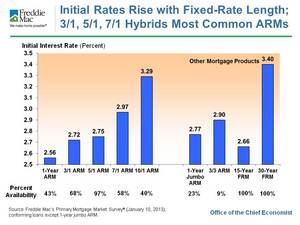MCLEAN, VA--(Marketwire - Jan 16, 2013) - Freddie Mac (
News Facts
- Initial-period rates on ARMs were at the lowest levels recorded in the 29-year history of the ARM pricing survey, reflecting in part the Federal Reserve's accommodative monetary policy. This policy has kept short-term rates very low and, over the past year, helped to lower longer-term interest rates.
- Hybrid ARMs continued to be the most popular loan product offered by lenders and chosen by ARM borrowers. Hybrid ARMs have an extended initial fixed-rate period -- generally three to ten years -- and then adjust annually thereafter. Nearly all of the ARM lenders participating in the survey offered a hybrid. The 5/1 hybrid (a five-year fixed-rate initial period before the rate resets annually) was by far the most common, followed by the 3/1, 7/1 and 10/1. Far less common were ARMs where the repricing frequency was fixed for the life of loan, such as a one-year adjustable or a 3/3 ARM, which adjusts once every three years.
- In early January 2013, the interest rate savings for the 5/1 hybrid ARM with a 30-year term -- the most common ARM offered in today's market -- compared to the 30-year fixed-rate mortgage amounted to about 0.65 percentage points. For a $250,000 loan, the monthly payment on a 5/1 hybrid would be almost $90 less than on the 30-year fixed-rate loan over the first five years of the loan.
- Compared with last year, the largest declines in initial interest rates among hybrid products occurred with the 7/1 and 10/1 hybrids. For these products with long initial fixed-rate periods, rates declined by 0.32 and 0.57 percentage points, respectively. The larger declines for these products reflect the Federal Reserve's efforts, through the latest round of quantitative easing, to reduce long-term mortgage rates.
- Among the 131 ARM lenders surveyed, 69 percent offered loans tied to Treasury yields, up from 65 percent in 2012; the remaining offered products tied to the London Interbank Offered Rate (LIBOR). LIBOR-indexed ARMs generally had a lower margin (about 0.5 percentage points lower) than Treasury-indexed ARMs, a similar initial interest rate, but a higher fully indexed rate. The higher fully indexed rate reflects the fact that one-year LIBOR yields averaged 0.7 percentage points above one-year Treasury yields in early January.
Quotes:
Attributed to Frank Nothaft, vice president and chief economist, Freddie Mac.
- "Homebuyers have shied away from ARMs, particularly 1-year ARMs, because they are wary of the risk and uncertainty. The potential for much larger payments if, interest rates are significantly higher in the future, and the high delinquency rates borrowers have experienced on ARMs in recent years, have led consumers to prefer fixed-rate loans instead of ARMs. In addition, fixed-rate loans currently carry rates near historic lows, and only a small amount above initial rates on ARMs.
- "Borrowers who have taken out ARMs generally prefer hybrids, because these products include an extended initial period where the interest rate is fixed. During 2012, ARMs comprised one-in-ten new home-purchase loans, according to the Federal Housing Finance Agency. We are expecting ARMs to gradually gain back some favor with mortgage borrowers, with the ARM share rising to 12 percent of the home-purchase market in 2013."
Visit the following link for the Treasury-Indexed ARM Features in the January 2013 table:
http://www.freddiemac.com/news/finance/popup/20130116_arm_survey.html
Get the latest information from Freddie Mac's Office of the Chief Economist on Twitter: @FreddieMac
Freddie Mac was established by Congress in 1970 to provide liquidity, stability and affordability to the nation's residential mortgage markets. Freddie Mac supports communities across the nation by providing mortgage capital to lenders. Today Freddie Mac is making home possible for one in four homebuyers and is one of the largest sources of financing for multifamily housing. www.FreddieMac.com.
Contact Information:
MEDIA CONTACT:
Chad Wandler
703-903-2446
Chad_Wandler@FreddieMac.com
